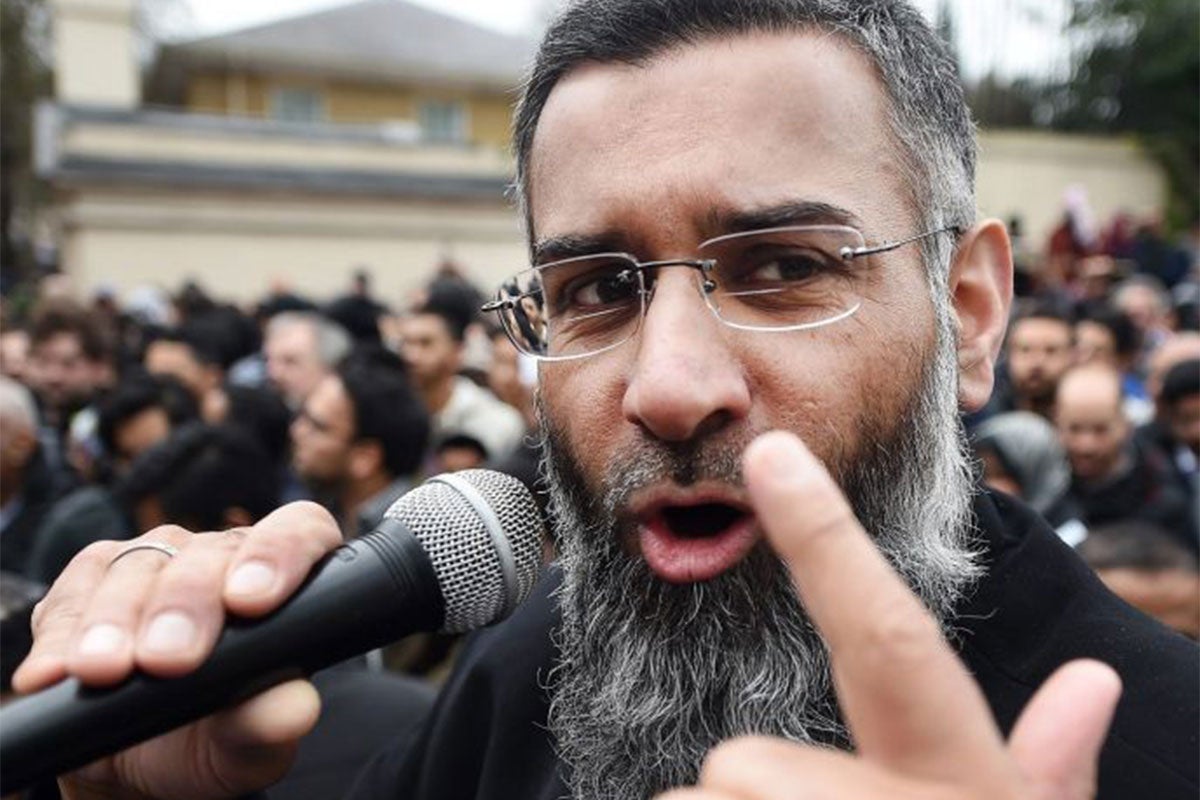Anjem Choudary prison release could worsen both Islamist and far-right extremism, experts warn
Extremist preacher to be released under tight restrictions as recruiting pool diminished by rise of Isis and security crackdown

The release of hate preacher Anjem Choudary could worsen extremism among both Islamists and the far right, experts have warned.
Choudary was jailed for inviting support for Isis in 2016 but is expected to be imminently freed under tight licence conditions aiming to prevent the revival of his banned extremist group al-Muhajiroun.
The government vows that MI5 will be watching the cleric “like a hawk” but there are fears that his release will invigorate his supporters, and far-right groups like the English Defence League (EDL).
The Faith Matters counter-extremism network warned that Choudary was part of a “dance of hate where the only ones to profit have been the extremists”.
Forecasting an increase in far-right activity around his release, which has already been seen with the launch of petitions and planned protests, the group said: “It may also embolden enablers of Islamist extremism who continue to promote a 'them and us' mentality that seeks to mentally marginalise British Muslims from mainstream society.”
Choudary and his followers were active from the early 2000s, aiming to convert people to Islam and radicalise Muslims with leafleting, stalls, talks and protests across the country.
Muslim councillors and MPs were among their targets as they promoted the idea of a clash of civilisations between Islam and the West.
Choudary, a former solicitor, frustrated the security services by treading a careful line to keep his incendiary speeches just outside British terror legislation while gaining media coverage with provocative protests.
Al-Muhajiroun and its renamed affiliates were eventually banned as terrorist groups and Choudary himself has been listed as a “specially designated global terrorist” by the US State Department.
His followers have included numerous men who went to fight for Isis, including executioner Siddhartha Dhar, Lee Rigby’s murderers and the London Bridge attack ringleader Khuram Butt.
Other terrorists linked to al-Muhajiroun include 7/7 bomber Mohammad Sidique Khan, Mike’s Place attacker Omar Khan Sharif, Kashmir suicide bomber Bilal Mohammed and the men behind plots including the planned Ministry of Sound bombing, truck attack in Oxford Street and London Stock Exchange mail bombings.
Fiyaz Mughal, the director of Faith Matters, said Choudary’s influence showed that extremism must be “disrupted, challenged and pushed out of the public space at every point”.
“Choudhary was regarded by many as a clown in the 1990s and with no real traction, yet we can see now just how mistaken this belief was,” he added.
“He systematically preyed on vulnerable young men while inculcating them with messages of alienation and disaffection for our country. When groups like Isis and al-Qaeda came along, Choudhary's warped beliefs bore fruit as the young men he helped brainwash headed out to areas such as the Middle East, while other associates such as Westminster attacker Khalid Masood sought to wreak terror on our streets.”
Masood was found to be a contact of numerous al-Muhajiroun members in Luton and Crawley but was not a member himself.
While Choudary is due to be released this month alongside co-defendant Mohammed Mizanur Rahman, several other associates are also currently under licence conditions or Terrorism Prevention and Investigation Measures that will expire in time.
Adam Deen, a former member of al-Muhajiroun who is now the executive director of the Quilliam counter-extremism think tank, said it could be “back to square one” for authorities.
He told The Independent that it was unclear how many members of the network remained active, after a number of terror plotters were jailed and others were killed fighting for Isis in Syria and Iraq.
“I would expect a rebirth of al-Muhajirioun, probably smarter and more cautious of the law,” Mr Deen added.
“I’m not too sure how much support Anjem is going to have when he comes out but most definitely he’s not going to stay quiet.”
Choudary was moved to a specialist secure “separation centre” at HMP Frankland in County Durham to curtail his influence on fellow inmates, amid warnings that a record number of jailed terrorists could dramatically increase radicalisation in UK prisons.
Mr Deen, who acted as a recruiter for al-Muhajiroun before leaving in 2003, said Choudary could emerge from prison “more fervent” in his beliefs, while his supporters perceive him as a “martyr” to their cause.
“These people should be the number one priority for security services because even if they aren’t carrying out [terror] activity themselves they are recruiting,” he warned.
Several of Choudary’s former associates have been spotted preaching their creed at Speakers’ Corner in Hyde Park this year and others have been seen at “dawah” stalls giving out leaflets and copies of the Quran.

Dr Michael Kenney, a University of Pittsburgh professor and author of The Islamic State in Britain, said the network have been “meeting, engaging in low-level preaching and related activities” during Choudary’s imprisonment.
He said that while some only believe in the “jihad of the tongue”, escalation to violence can happen extremely quickly, as it did for Masood.
But Dr Kenney, who followed al-Muhajiroun for five years for his research, said the group had made a “strategic mistake” by aligning itself with Isis and losing any claim to protect the interest of Muslims.
“Al-Muhajiroun has never been more marginalised in Britain,” he said. “They publicly identified themselves as Isis supporters and then the world saw what a grotesque monstrosity the Isis caliphate was.
“Most British Muslims can’t stand that and it didn’t do Choudary and his merry band any favours… people don’t hear what they’re preaching, wherever they go they get confronted by Muslims.”
Dr Kenney said Choudary’s network has been left “very weak” by global outcry against Isis and a crackdown by security services.
He added: “The recruiting environment is very bad for them right now, particularly after Isis’ atrocities and the attacks in Britain. People don’t want to hear what they are preaching anymore.”
